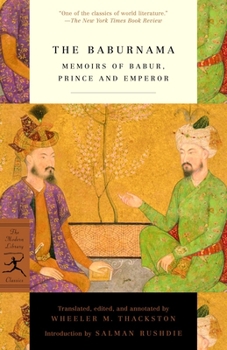The Baburnama: Memoirs of Babur, Prince and Emperor
Select Format
Select Condition 
Book Overview
The great-great-great grandson of Tamerlane, the great Mongol ruler of Samarkand who defeated the Ottomans in 1402, Zahiruddin Muhammad Babur Mirza (1483-1530)--better known as Babur Padisha--was the... This description may be from another edition of this product.
Format:Paperback
Language:English
ISBN:0375761373
ISBN13:9780375761379
Release Date:September 2002
Publisher:Modern Library
Length:608 Pages
Weight:0.20 lbs.
Dimensions:1.3" x 5.2" x 8.0"
Customer Reviews
5 ratings
Great Book
Published by Thriftbooks.com User , 18 years ago
The book itself is excellent. I had problems with Salman Rushdie's preface, however. It is not a bad introduction, but some of his comments seem to be flawed. The writer explains the contradictory aspect of Babur's psychology (both ruthless/aggressive and soft/cultured) as the outcome of two conflicting "aspects" within Islam. Mr Rushdie does not explain how he arrives at this conclusion, however, and he fails to mention the possibility that Babur's aggression might have naturally stemmed from his Mongol background & warrior instincts. In addition, in the 2nd last paragraph, Rushdie seems to contradict himself when he compares Babur to Machiavelli: "In both men, a cold appreciation of the necessities of power, of what today would be called realpolitik, is combined with deeply cultured and literary nature, not to mention the love, of excess, of wine and women."
A World Classic
Published by Thriftbooks.com User , 21 years ago
I would compare this extraordinary memoir by an extraordinary man to The Tale of Genji - both of them are "firsts" in their culture. The descendants of Tamerlane were both ruthlessly crafty Central Asian kings and warriors, and ultra refined conoisseurs of art and architecture, poetry, food, gardens, and (alas for them) wine. The Baburnama has it all. To encounter the private thoughts of a great conquerer is a unique experience. The Baburnama is well-written and well translated. It is one of the great treasures of literature, and will give the reader a much better idea why Afghanistan and Central Asia are the way they are.
Masterpiece
Published by Thriftbooks.com User , 21 years ago
Babur, a descendant of both Timur and Genghis Khan, was a truly remarkable man: a soldier and a poet, an inspirational leader with a deep appreciation for the beauties of nature - and a sensitivity that seems striking to us in a warrior of his undoubted stature.His memoirs are a detailed, entertaining, and highly personal view of a changing world. In leading his followers into northern India, he laid the groundwork for the Mughal Empire, one of the great Islamic powers of the early modern period - and it is this achievement that history primarily remembers him for. Yet the _Baburnama_ shows that there is considerably more to the story than its conclusion.With unstinting and engaging honesty, Babur talks of his early struggles, his constant setbacks, and his lifelong desire to hold Samarkand, glorious seat of his ancestor Timur (Tamerlane). For Babur, India is only the consolation prize after his failure to reconquer the lands of his birthright; India is rich, yes, astoundingly so, but it is far removed from his fond reminiscences of home. Along the way, reports of skirmishes with his enemies, and the constant betrayals of his allies, share the page with descriptions of local flora and fauna, and fascinating observations on everyday life in the cities and towns that he spends time at - and it is here that the work's true enjoyment lies.Bear with the initially confusing internecine squabbles of the Central Asian nomads, and you'll be richly rewarded. A comprehensive and compelling insight into both Central Asia at the turn of the sixteenth century, and the day-to-day pressures inherent in the leadership of an empire based on conquest.
A True King
Published by Thriftbooks.com User , 23 years ago
Babur was a king in the true sense of the word. His autobiography outlines his feirceness as a warrior as well as his compassion toward the people in his court. Although he lived in a time where one would think there would be little time for introspection, this is exactely what his narrative is: and introspective look at his own life, his shortcomings, his downfalls, his triumphs and tragedies. One is touched by Babur's humbleness, his sensitivity towards some of the most simple of things, and at his sense of awe and appreciation of beauty in the world around him. Although in some ways I prefered the AS Beveridge translation, this is also a wonderful translation with beautiful pictures and notes in the margins to help explain things. Even if you are not normally interested in this type of book, Babur leads you into his world and you are compelled to read on!
a unique inside view of kingship.
Published by Thriftbooks.com User , 25 years ago
In this book we read the thoughts of a man who lived more than 400 years ago and was the founder of one of the great empires of the world. It is remarkable that he found the time to write in so much detail about his experiences yet being so busy defending and building an empire all his life starting from the time he became a king at the age of tweleve. Never before or since do we get such an intimate glimpse at what it means to be a king. It is refreshing to read it today as it must have been then.




